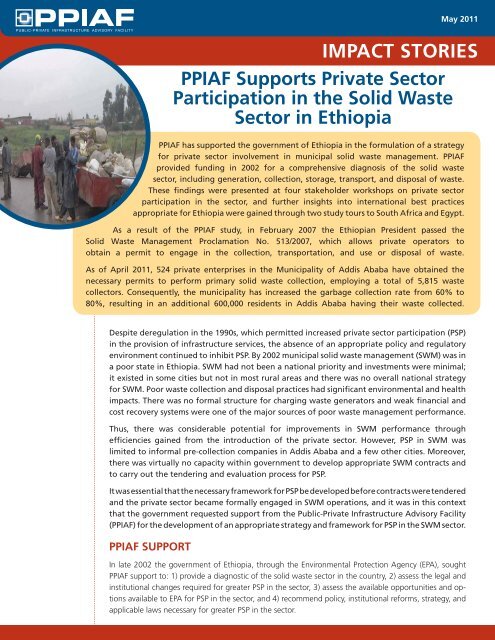PMR cover.psd - ppiaf
PMR cover.psd - ppiaf
PMR cover.psd - ppiaf
Create successful ePaper yourself
Turn your PDF publications into a flip-book with our unique Google optimized e-Paper software.
PUBLIC-PRIVATE INFRASTRUCTURE ADVISORY FACILITY<br />
May 2011<br />
IMPACT STORIES<br />
PPIAF Supports Private Sector<br />
Participation in the Solid Waste<br />
Sector in Ethiopia<br />
PPIAF has supported the government of Ethiopia in the formulation of a strategy<br />
for private sector involvement in municipal solid waste management. PPIAF<br />
provided funding in 2002 for a comprehensive diagnosis of the solid waste<br />
sector, including generation, collection, storage, transport, and disposal of waste.<br />
These fi ndings were presented at four stakeholder workshops on private sector<br />
participation in the sector, and further insights into international best practices<br />
appropriate for Ethiopia were gained through two study tours to South Africa and Egypt.<br />
As a result of the PPIAF study, in February 2007 the Ethiopian President passed the<br />
Solid Waste Management Proclamation No. 513/2007, which allows private operators to<br />
obtain a permit to engage in the collection, transportation, and use or disposal of waste.<br />
As of April 2011, 524 private enterprises in the Municipality of Addis Ababa have obtained the<br />
necessary permits to perform primary solid waste collection, employing a total of 5,815 waste<br />
collectors. Consequently, the municipality has increased the garbage collection rate from 60% to<br />
80%, resulting in an additional 600,000 residents in Addis Ababa having their waste collected.<br />
Despite deregulation in the 1990s, which permitted increased private sector participation (PSP)<br />
in the provision of infrastructure services, the absence of an appropriate policy and regulatory<br />
environment continued to inhibit PSP. By 2002 municipal solid waste management (SWM) was in<br />
a poor state in Ethiopia. SWM had not been a national priority and investments were minimal;<br />
it existed in some cities but not in most rural areas and there was no overall national strategy<br />
for SWM. Poor waste collection and disposal practices had signifi cant environmental and health<br />
impacts. There was no formal structure for charging waste generators and weak fi nancial and<br />
cost re<strong>cover</strong>y systems were one of the major sources of poor waste management performance.<br />
Thus, there was considerable potential for improvements in SWM performance through<br />
effi ciencies gained from the introduction of the private sector. However, PSP in SWM was<br />
limited to informal pre-collection companies in Addis Ababa and a few other cities. Moreover,<br />
there was virtually no capacity within government to develop appropriate SWM contracts and<br />
to carry out the tendering and evaluation process for PSP.<br />
It was essential that the necessary framework for PSP be developed before contracts were tendered<br />
and the private sector became formally engaged in SWM operations, and it was in this context<br />
that the government requested support from the Public-Private Infrastructure Advisory Facility<br />
(PPIAF) for the development of an appropriate strategy and framework for PSP in the SWM sector.<br />
PPIAF SUPPORT<br />
In late 2002 the government of Ethiopia, through the Environmental Protection Agency (EPA), sought<br />
PPIAF support to: 1) provide a diagnostic of the solid waste sector in the country, 2) assess the legal and<br />
institutional changes required for greater PSP in the sector, 3) assess the available opportunities and options<br />
available to EPA for PSP in the sector, and 4) recommend policy, institutional reforms, strategy, and<br />
applicable laws necessary for greater PSP in the sector.

















